[display-name-category]
[post_author]
Search Engines have their own algorithm. So far the tips that we have provided are to optimize for Google search results.
But if you’re ranking well in Google that means that you’re ranking in Yahoo, Bing, and other search engines, right? Not necessarily true.
In this post, we will discuss the similarities and the differences between search engines, ranking factors, and why it is important to be optimized for all.
Similarities Between Search Engines
When optimizing for Google, Bing, and Yahoo you will find that their several similarities will help you boost your local business. Keep in mind the following:
1) Links, Links and More Links
A website without links is like a body without bones. To navigate from one page to another you need to create the appropriate structure and links. There are two ways to do this:
Internal Links
Internal links are the ones you have control over since they are created in the same domain and directed to a different page.
A good website structure enables these three things:
1) Crawlability: website crawler-friendly.
2) Scalability: user-friendly. Specifically, the ease at which additions/edits/changes can be made to the website by the business owner.
3) Tiered Structure: website crawler-efficient. The crawler should be able to enter your website from any page and capture concise information about the product or service.
Website crawlers need a well-defined pathway that will allow them to easily navigate the structure you’ve created for your website. Using internal linking will allow you to transfer value from your first page (home page) to other pages that have true potential to rank in a higher position.
Your home page should always be the most relevant page from your site and therefore be the most visited. Take advantage of this and create a link structure on your home page that presents users with a simple, yet intuitive site menu and navigation.
These are the winners of Best Navigation/Structure at The Webby Awards 2015: The Nasa GeneLab and the Design Museum. These sites were chosen because they offer the best possible user experience through superior navigation and site structure. Only information architecture was judged.
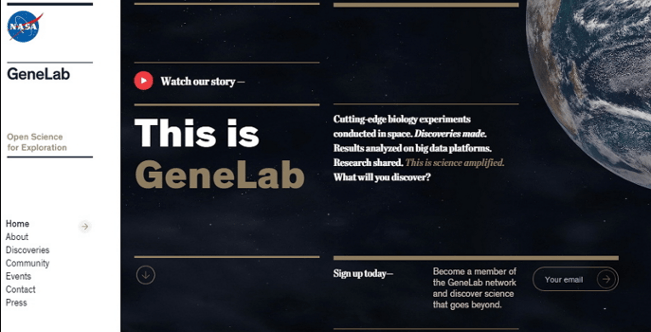

External Links
From an SEO point of view, external links are the most important source of ranking power for you and your website, but acquiring an external link requires time and patience; this practice is known as Link Building.
External links must be popular and relevant to your site.
Use the Google Search Console to check those sites linking to you. Go to the Search Console Menu, Look for “Search Traffic” and then click on “links to your site”. You should be able to see the top 5 external links.
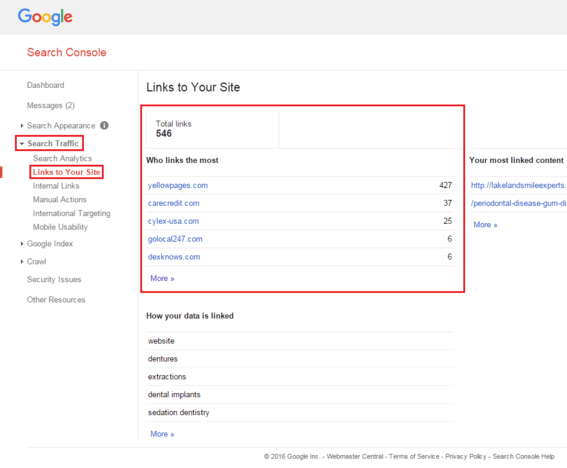
2) Mark Your Territory - Local Search
When creating content for Search Engines, we recommend incorporating keywords based on geo-locations. Using geo-modifiers will help you mark your local presence in the area targeted.
When creating local content for your site, keep in mind the following:
Identify Your Local Audience
-
-
- Who will be reading your content?
- You can use Google Trends and Google Keyword Planner Tool for insight.
-
Set Your Goals
-
-
- Remember the purpose of the content.
- What do you want to achieve with your content?’
-
Audit Your Content
-
-
- How has the current content you’ve created helped you reach your goals?
- What is the value of your site’s current pages?
- Use Open Site Explorer to identify if your content has incoming links.
-
Develop Consistency (Create a Calendar)
-
- Establish a calendar to schedule deadlines and weekly deliverables.
Promote Your Content
-
-
- This is the fun part. Now that your content is published, you can tell the world how important and unique it is.
- Use social media like Facebook, Twitter, and Google My Business.
-
3) Rented Space - Paid Search
SEO is great for brand awareness, but a common setback is that it can take months to reach a high position. Paid search gathers keywords insights and lets you know which ones are working better than others, so you are more likely to reach a high position quicker in SERPs.
Paid search is a great strategy to work hand in hand with SEO. It can catapult your SEO efforts because it works a lot faster and if done right, SEO can lower-paid advertising costs through organic traffic.
Differences Between Search Engines
So, we went over the similarities between search engine optimization. Let’s talk about the differences now:
4) How Are Keywords Recognized?
If you search for Pest Control in Pembroke Pines you will notice that results are different in Google, Yahoo, and Bing. In terms of relevant search results, Google goes about it differently than the others.
This is because Google recognizes synonyms, while other search engines use exact match keywords. This limits their understanding of users’ search intents.
Google:
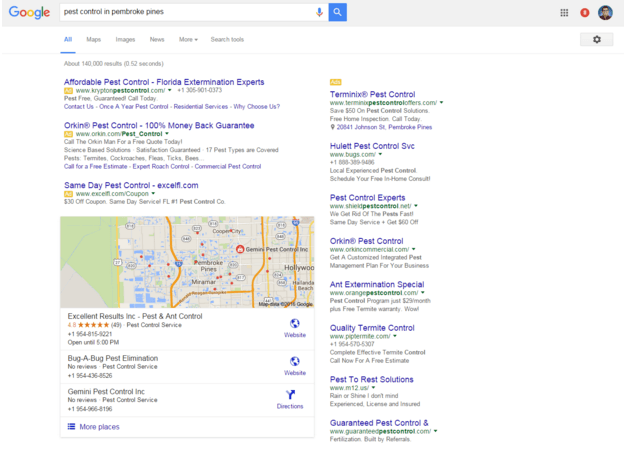
Bing:
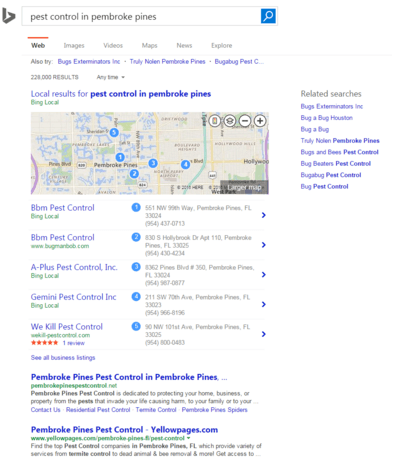
Yahoo:
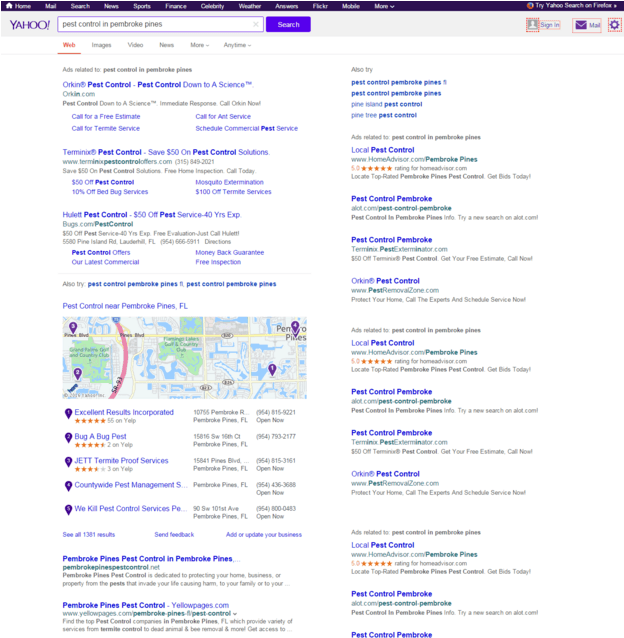
You will especially be able to see the difference if you have set up Google Search Console and Bing Webmaster tools.
For the long-tail keyword “fishing in Puerto Rico” for Caribbean Outfitters, the ranking position in Google is 1.8 (meaning that usually, the keyword ranks between the first and the second position on the first page).

In the Bing webmaster tool the same keyword the avg. the rank position is 7.2 (meaning that it ranks between the position 7 – 8 on the first page.

![]()
5) What Determines Page Authority?
Other search engines take domain age into account as a ranking factor, which means that if you started the business 20 years ago and you had no competition you will always outrank new competitors.
6) Those Darn Double Meaning Search Queries
Search engines’ most difficult job is to identify the search intent with the littlest amount of information from the user. It’s like trying to hit a target a hundred miles away! Now, imagine when users enter words with double meaning.
When a search engine finds a keyword phrase with two meanings, Google will present the results and will ask you which search results you would like to see, based on popularity.
On Bing, the search engine will give you different keyword suggestions for you to present a different search result and on Yahoo, it will present all the search results related to that search term.
For example, the word bat has 4 different meanings: bat as the animal, bat as the baseball equipment, BAT as a file extension, and bat as the acronym for the British American Tobacco. Check how each search engine handles the SERPs,
Bing:

Yahoo:

Google:

7) Google Can’t Read Flash Content
We usually recommend creating websites compatible with Google, because if you optimize for Google it will help you in other search engines for sure.
Make Sure All Your Bases Are Covered
Changes in search engine algorithms happen every day and it’s important to keep yourself updated. When optimizing your website, make sure you cover all of your bases by including strategies to rank for all the top search engines.
Do you know any similarities and differences between search engines? Share it below.






